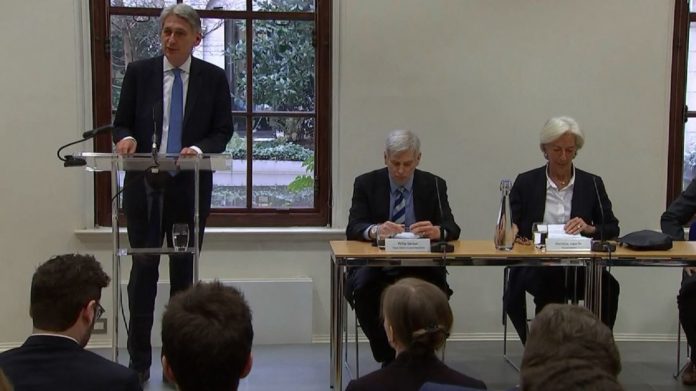The International Monetary Fund (IMF) released its outlook for the U.K. economy Wednesday, projecting GDP growth for 2018 at 1.5 percent — down from 1.6 percent in 2017 — citing Brexit uncertainty as the main weight on growth.
“Despite a strong recovery in global growth and strong macroeconomic policies, the impact of the decision to exit the European Union has weighed on private domestic demand,” the IMF said in its concluding statement of the 2017 Article IV mission, an annual health-check on the country’s economy.
“Our forecast for 2018 is 1.5 percent as uncertainty about the shape of Brexit persists, most likely, and inflation remains above target,” IMF Managing Director Christine Lagarde said in London Wednesday morning. “The less uncertainty, the greater the upside risk — the more uncertainty, the more that forecast is at risk.”
Amid largely uniform global growth, “The U.K. economy is losing out as a result of the (Brexit) decision — higher inflation, pressure on wages, delayed investment simply as a result of the uncertainty,” Lagarde added. The IMF in September forecast global growth for 2017 and 2018 at 3.6 percent and. 3.7 percent, respectively.
Recent progress in Brexit talks was welcome, the Fund noted, but added that there was a very long list of tasks ahead with a very ambitious time frame, including reaching a trade deal with the EU, negotiating new arrangements with some 60 countries, boosting human and IT resources in customs and other areas, and translating thousands of pages of EU law into U.K. domestic statute.
The IMF also expects inflation to ease in the coming months, though not below the Bank of England’s target level of 2 percent. Inflation reached 3.1 percent for November, revealing a continued squeeze on household income and consumption.
Productivity growth also remains a deadweight on the country, and was described in the Fund’s statement as “extremely weak.” Any new barriers to the cross-border flow of goods and labor would continue to negatively affect productivity performance, the Fund warned.
Lagarde described the U.K. as “underinvested” when it came to infrastructure and innovation, and said it “fell short” in human capital development. Business investment is at 2.1 percent, a figure she believed should be at 6 percent amid the current global upswing.
John McDonnell MP, Labour’s Shadow Chancellor, commenting on the IMF’s report out today, said:
“The IMF has today played the role of the ghosts of Christmas past, present and future to remind the Chancellor that the last seven years of Tory economic failure is undermining our economy.
“They confirmed the downbeat assessment last month by the OBR, highlighting low growth, the Government’s productivity failure and neglect of the regions. The report also confirmed what we all know, that Conservative governments are good at cutting public services to give tax cuts to a wealthy few, but hopeless at investing in the skills and infrastructure our country needs to develop an economy for the many.
“As the IMF rightly points out, despite strong global growth, UK economic growth is revised down, and business growth is down despite Tory tax giveaways to big business; while working households this Christmas are struggling with rising prices and lagging wages.
“In addition, this report can be seen as further proof that the Tories have completely lost the economic argument. Austerity has failed and will only continue to undermine our economy during the Brexit negotiations.
“The next Labour government will end austerity and provide the proper investment our country needs, underpinned by our Fiscal Credibility Rule, to build a high wage, high skill economy for the many not the few.”







